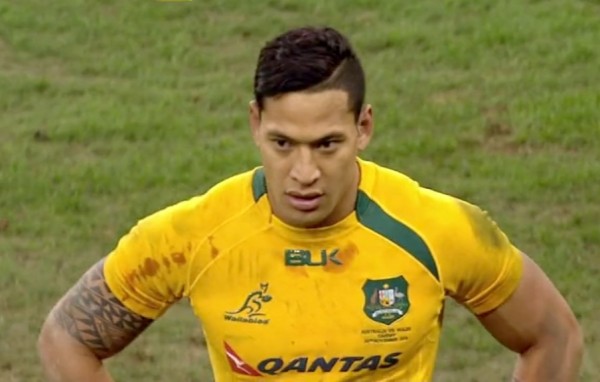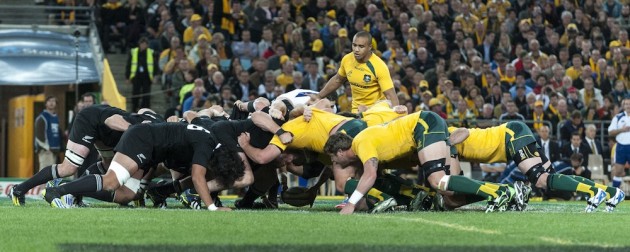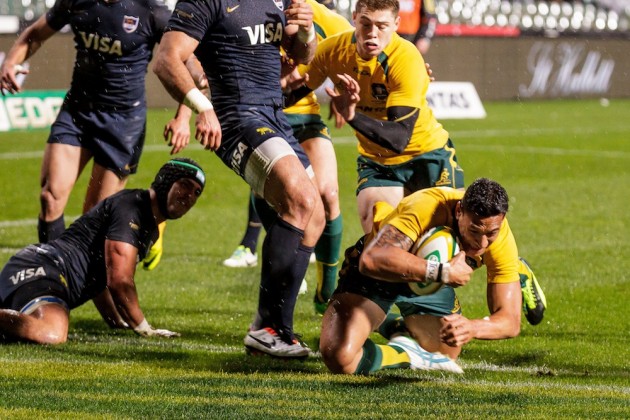“There are known knowns; there are things we know that we know.
There are known unknowns; that is to say, there are things that we now know we don’t know.
But there are also unknown unknowns – there are things we do not know we don’t know.”
Donald Rumsfeld, US Secretary of Defense
It’s been a rollercoaster year for the Wallabies. But amid all the talk of Folau this and Fardy that, of the Quade revival and the contrasting fortunes of his other amigos, the reality is that looking forward the Wallabies’ equation is one of Known Unknowns. Rumsfeld might not have picked the most direct way of communicating his point – but he still had a point, and it’s an important one.
In 2011, few observers would have thought that the Wallabies’ World Cup campaign – indeed the Deans era – would have come unstuck because of an inability to deal with the grapple tackle, an obsession with the box kick, and the failure to have a specialist back-up for David Pocock. These were all (more or less) unknown unknowns.
But looking ahead to 2015, it’s crystal clear where the Wallabies shortcomings lie. If the men in gold come up short two years from now, it’ll doubtless be due to the following things.
1) The Scrum
An obvious point, but an important one. Put simply, the Wallabies won’t be bringing home Bill without a major improvement in the scrum department – and a commensurate alternation in perceptions among fans and referees alike. It’s hard right now to see exactly where that’s going to come from. As numerous pieces on this site have noted, much of Australia’s problems have been due to inconsistent body height, loose binds, and backrowers not pushing.
But it’s still hard to see Australia winning the Cup without a great cohort of seasoned scrummagers. Developing world class props needs to be Australian rugby’s top priority; it’s a known unknown.
2) Winning Ugly
In a conversation with a mate from England recently, he pointed out that it was probably easier to learn to play expansively than it was to win ugly. I disagree. England have shown many times that in order to play expansively at the highest level you need practice executing those skills under pressure and trust that your teammates, equally, can implement the game plan on the day.
Without practice, how are you going to reproduce that on the greatest stage of all? But the same probably goes for winning ugly. Can the Wallabies develop a number of kickers who on any given day kick like Morne Steyn and Johan Goosen, and not Aaron Cruden? Can they develop a number of drop goal merchants (Quade’s miss against Wales was a reminder that this isn’t a skill set in which the Wallabies are strong)? Can the Wallabies win in driving rain or greasy conditions?
3) Abrasiveness in the Forwards
This was a tough season for fans. The Wallabies often looked like they were in third gear against the Lions. They got wiped out twice by the All Blacks and Springboks each. But the most disappointing game of the year was against England – a team playing within its limits if ever there was one. The Wallabies could not counter a simple game plan based on flooding rucks and defending narrowly.
Before 2015, they need to learn how to do that – how to use the opposition overcommitting to rucks against them, how to dominate both the initial tackle and secondary ruck, how to stretch the narrow defence instead of just kicking over it.
4) Depth
The one question every Wallaby fan should be asking themselves right now, on the back of a successful European tour is this: How bad would 2013 have been if the Waratahs hadn’t picked up Israel Folau? Bad. Very bad.
To win a World Cup, you have to have depth. The All Blacks showed this last tournament, finishing on their fourth fly half by the end of the tournament. The Wallaby coaching staff needs to think about this now. If Quade isn’t in the 10 jersey, who is going to get enough test experience to direct the team around by 2015? If Folau pulls a hammy again, who is going to neutralise other teams exploiting the Aussies’ famed inabilities under the high ball?
Obviously, in the big matches, you want your best 15 out there. But you have to prepare as though that might not happen. Systems, game plans, patterns – all have to be more important than any one individual. If you rely on one player, you are always one tackle away from being rudderless in the middle of a match and an early flight home.
This therefore is the equation for 2015: the Known Unknowns. It’s a great situation to be in. If the Wallaby staff can cover the four items mentioned here, they’re in with a great shot of winning the next World Cup.




